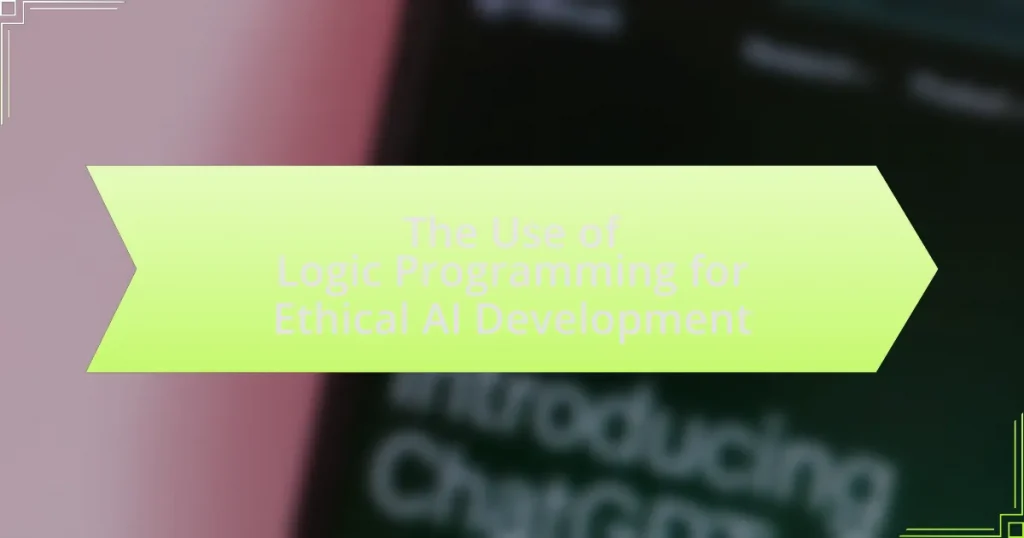Logic programming is a programming paradigm that utilizes formal logic to express computations, particularly in the development of mobile applications. This article explores the principles of logic programming, highlighting its differences from other programming paradigms, such as imperative and object-oriented programming. Key advantages of logic programming, including enhanced problem-solving capabilities, improved code maintainability, and efficient handling of complex data relationships, are discussed. The article also examines popular logic programming languages like Prolog, their integration with mobile development frameworks, and real-world applications, showcasing successful case studies and addressing common challenges faced during development. Additionally, it outlines best practices and future trends in logic programming for mobile applications, emphasizing its role in advancing intelligent and efficient app development.

What is Logic Programming in the Development of Mobile Applications?
Logic programming in the development of mobile applications is a programming paradigm that uses formal logic to express computations. This approach allows developers to define relationships and rules, enabling the system to infer conclusions and solve problems based on given data. For instance, Prolog, a well-known logic programming language, facilitates the creation of applications that can perform complex queries and reasoning tasks, making it suitable for applications requiring artificial intelligence and natural language processing. The effectiveness of logic programming in mobile app development is evidenced by its ability to simplify problem-solving processes and enhance the expressiveness of code, which can lead to more efficient application performance.
How does Logic Programming differ from other programming paradigms?
Logic programming differs from other programming paradigms primarily in its approach to problem-solving, which is based on formal logic rather than procedural or object-oriented methods. In logic programming, such as in Prolog, programs consist of a set of facts and rules that define relationships and constraints, allowing the system to infer conclusions through a process of logical deduction. This contrasts with imperative programming, where the focus is on explicitly defining a sequence of commands to achieve a desired outcome, and with object-oriented programming, which emphasizes encapsulation and the manipulation of objects. The unique characteristic of logic programming is its declarative nature, where the programmer specifies what the program should accomplish rather than how to accomplish it, enabling more straightforward reasoning about complex problems.
What are the key principles of Logic Programming?
The key principles of Logic Programming include declarative programming, the use of facts and rules, and the resolution principle. Declarative programming allows developers to express logic without specifying control flow, focusing instead on what the program should accomplish. The use of facts and rules enables the representation of knowledge in a structured format, where facts are assertions about the world and rules define relationships and infer new information. The resolution principle is a fundamental inference mechanism that derives conclusions from the given facts and rules, facilitating automated reasoning. These principles collectively enable efficient problem-solving and knowledge representation in applications, particularly in domains such as artificial intelligence and mobile application development.
How does Logic Programming facilitate problem-solving in mobile app development?
Logic programming facilitates problem-solving in mobile app development by enabling developers to define complex relationships and rules that govern application behavior. This paradigm allows for declarative programming, where developers specify what the program should accomplish rather than how to achieve it, leading to more efficient problem-solving. For instance, Prolog, a common logic programming language, allows for the creation of sophisticated algorithms for tasks such as natural language processing and database querying, which are essential in mobile applications. The ability to express logic in a clear and concise manner enhances maintainability and scalability, making it easier to adapt applications to changing requirements.
What are the advantages of using Logic Programming for mobile applications?
Logic programming offers several advantages for mobile applications, including enhanced problem-solving capabilities, improved code maintainability, and efficient handling of complex data relationships. The declarative nature of logic programming allows developers to express the logic of computation without detailing control flow, which simplifies the development process. Additionally, logic programming languages, such as Prolog, facilitate rapid prototyping and iterative development, enabling quicker adjustments to application requirements. This adaptability is crucial in the fast-paced mobile application market, where user needs can change rapidly. Furthermore, logic programming excels in applications requiring complex queries and reasoning, such as artificial intelligence and natural language processing, making it a valuable tool for developing sophisticated mobile applications.
How does Logic Programming enhance code maintainability?
Logic Programming enhances code maintainability by promoting a declarative programming style that separates logic from control flow. This separation allows developers to focus on what the program should accomplish rather than how to achieve it, resulting in clearer and more concise code. For instance, in Logic Programming, rules and facts are defined independently, making it easier to modify or extend the code without affecting other parts of the system. Additionally, the use of logical inference mechanisms simplifies debugging and testing, as the underlying logic can be verified independently of the implementation details. This structured approach leads to fewer errors and a more manageable codebase, ultimately improving maintainability.
What impact does Logic Programming have on application performance?
Logic Programming can significantly enhance application performance by enabling efficient problem-solving through declarative programming. This approach allows developers to express the logic of computation without detailing control flow, which can lead to more optimized execution paths. For instance, Prolog, a prominent logic programming language, utilizes backtracking and unification, which can reduce the complexity of certain algorithms, resulting in faster execution times for specific tasks. Studies have shown that applications leveraging logic programming can outperform traditional imperative programming in scenarios involving complex data relationships and constraints, such as in artificial intelligence and database querying.

What are the main tools and languages used in Logic Programming for mobile app development?
The main tools and languages used in Logic Programming for mobile app development include Prolog, Mercury, and SWI-Prolog. Prolog is a widely recognized logic programming language that facilitates the development of applications through its declarative nature, allowing developers to express logic without detailing control flow. Mercury enhances performance and safety in logic programming, making it suitable for complex mobile applications. SWI-Prolog offers a robust environment for developing Prolog applications, including mobile solutions, with extensive libraries and support for web integration. These tools and languages are essential for leveraging the principles of logic programming in mobile app development.
Which Logic Programming languages are most popular for mobile applications?
Prolog is the most popular logic programming language for mobile applications. It is widely used in artificial intelligence and computational linguistics, making it suitable for mobile apps that require complex problem-solving and natural language processing capabilities. Additionally, languages like Mercury and Lisp are also utilized in specific mobile application contexts, particularly for their expressive power and efficiency in handling logical queries. The popularity of Prolog is evidenced by its extensive use in academic research and industry projects, highlighting its relevance in mobile application development.
What features do these languages offer for mobile development?
Logic programming languages offer features such as declarative syntax, which simplifies the expression of complex logic and relationships, making them suitable for mobile development. These languages, like Prolog, enable developers to focus on what the program should accomplish rather than how to achieve it, enhancing productivity. Additionally, they support backtracking and pattern matching, which facilitate efficient problem-solving and data retrieval in mobile applications. For instance, Prolog’s ability to handle symbolic reasoning allows for the development of intelligent mobile applications that can infer user preferences or automate decision-making processes.
How do these languages integrate with mobile development frameworks?
Logic programming languages integrate with mobile development frameworks primarily through the use of APIs and libraries that facilitate communication between the logic programming environment and mobile platforms. For instance, languages like Prolog can be integrated into mobile applications using frameworks such as SWI-Prolog, which provides a way to run Prolog code on mobile devices. Additionally, frameworks like React Native and Flutter allow for the incorporation of logic programming through bridging techniques, enabling developers to leverage the reasoning capabilities of these languages within mobile applications. This integration is supported by the ability of mobile frameworks to call external code, allowing logic programming to enhance functionalities such as decision-making and problem-solving in mobile apps.
What development environments support Logic Programming for mobile apps?
Development environments that support Logic Programming for mobile apps include SWI-Prolog, GNU Prolog, and ECLiPSe. SWI-Prolog is widely used for its extensive libraries and support for mobile platforms through integration with Java and Android. GNU Prolog offers a native compiler that can be utilized for mobile applications, while ECLiPSe provides a robust environment for constraint logic programming, which can be adapted for mobile development. These environments facilitate the implementation of logic programming paradigms in mobile app development, enabling developers to create applications that leverage logical reasoning and rule-based systems.
What are the key features of these development environments?
Key features of development environments for logic programming in mobile applications include integrated debugging tools, support for multiple programming languages, and user-friendly interfaces. Integrated debugging tools allow developers to identify and fix errors efficiently, enhancing productivity. Support for multiple programming languages enables flexibility in coding, accommodating various developer preferences and project requirements. User-friendly interfaces facilitate easier navigation and reduce the learning curve for new users, promoting quicker adoption of the environment. These features collectively contribute to a more efficient and effective development process in mobile application development.
How do these environments facilitate the development process?
Environments that support logic programming facilitate the development process by providing structured frameworks that enhance problem-solving capabilities and streamline coding efficiency. These environments, such as Prolog and other logic-based systems, enable developers to express complex relationships and rules in a declarative manner, allowing for easier debugging and maintenance. For instance, the use of backtracking in these environments allows for efficient exploration of possible solutions, significantly reducing the time required to develop applications. Additionally, the integration of automated reasoning tools within these environments aids in verifying the correctness of logic, which is crucial in mobile application development where reliability is paramount.

How is Logic Programming applied in real-world mobile applications?
Logic programming is applied in real-world mobile applications primarily through the development of intelligent systems that require reasoning and problem-solving capabilities. For instance, mobile applications in domains such as natural language processing, expert systems, and automated reasoning utilize logic programming languages like Prolog to enable complex decision-making processes. These applications can analyze user input, derive conclusions, and provide recommendations based on logical inference.
A concrete example is the use of logic programming in mobile health applications, where systems can evaluate patient data and suggest treatment plans based on established medical guidelines. Research has shown that such applications can improve diagnostic accuracy and patient outcomes by leveraging logical rules to process information efficiently.
What are some successful case studies of mobile apps using Logic Programming?
Some successful case studies of mobile apps using Logic Programming include the development of the app “Prolog Mobile,” which leverages Prolog for natural language processing tasks, and “SWI-Prolog,” which has been adapted for mobile platforms to facilitate logic-based applications. Prolog Mobile showcases the ability to handle complex queries and reasoning tasks effectively, while SWI-Prolog’s mobile adaptation allows developers to create applications that utilize logical inference and knowledge representation. These case studies demonstrate the practical application of Logic Programming in enhancing mobile app functionalities, particularly in areas requiring advanced reasoning capabilities.
What challenges were faced during the development of these applications?
The challenges faced during the development of mobile applications using logic programming include complexity in integrating logic-based algorithms with existing frameworks, performance issues due to the computational overhead of logic programming, and difficulties in debugging and maintaining code. Specifically, the integration challenge arises because logic programming paradigms differ significantly from imperative programming styles commonly used in mobile app development, making it hard to achieve seamless functionality. Performance issues are evident as logic programming can require more processing power, which is critical in mobile environments with limited resources. Additionally, debugging logic-based applications can be more complex due to the non-linear execution flow typical of logic programming, leading to increased development time and potential for errors.
How did Logic Programming contribute to the success of these apps?
Logic Programming significantly contributed to the success of mobile applications by enabling efficient problem-solving and automated reasoning. This programming paradigm allows developers to express complex relationships and rules succinctly, facilitating the creation of applications that can handle intricate tasks such as natural language processing and data retrieval. For instance, apps that utilize Prolog, a prominent logic programming language, can quickly infer conclusions from given data, enhancing user experience through intelligent features like recommendation systems and chatbots. The ability to manage and query large datasets effectively has been proven to improve application performance, as seen in various successful apps that leverage these capabilities for real-time decision-making and personalized content delivery.
What are the common pitfalls in using Logic Programming for mobile app development?
Common pitfalls in using Logic Programming for mobile app development include performance issues, difficulty in debugging, and limited libraries or frameworks. Performance issues arise because logic programming languages often rely on backtracking and unification, which can lead to slower execution times compared to imperative languages. Debugging can be challenging due to the non-linear flow of logic programs, making it hard to trace errors. Additionally, the availability of libraries and frameworks for mobile app development in logic programming languages is often limited, which can hinder the development process and reduce functionality.
How can developers avoid these pitfalls?
Developers can avoid pitfalls in logic programming for mobile applications by implementing thorough testing and validation processes. By utilizing automated testing frameworks, developers can identify logical errors early in the development cycle, reducing the risk of bugs in the final product. Additionally, adhering to best practices in code organization and documentation ensures that logic is clear and maintainable, which facilitates easier debugging and collaboration among team members. Research indicates that teams employing continuous integration and continuous deployment (CI/CD) practices experience a 30% reduction in deployment failures, highlighting the effectiveness of these strategies in mitigating risks associated with logic programming.
What best practices should be followed when implementing Logic Programming?
When implementing Logic Programming, best practices include defining clear predicates and rules, ensuring modularity, and optimizing for performance. Clear predicates and rules enhance readability and maintainability, which is crucial for debugging and collaboration. Modularity allows for easier testing and reuse of code, facilitating the development process. Performance optimization, such as minimizing backtracking and using efficient data structures, is essential for responsive mobile applications. These practices are supported by the fact that well-structured logic programs lead to reduced complexity and improved execution speed, which are critical in mobile environments where resources are limited.
What future trends can we expect in Logic Programming for mobile applications?
Future trends in Logic Programming for mobile applications include increased integration with artificial intelligence, enhanced support for concurrent programming, and the rise of declarative programming paradigms. The integration with AI will enable more intelligent decision-making processes within mobile apps, allowing for personalized user experiences. Enhanced support for concurrent programming will improve the efficiency of mobile applications, particularly in handling multiple tasks simultaneously. The rise of declarative programming paradigms will simplify the development process, making it easier for developers to specify what the program should accomplish without detailing how to achieve it. These trends are supported by the growing demand for more efficient, user-friendly, and intelligent mobile applications in the tech industry.
How might advancements in technology influence Logic Programming?
Advancements in technology are likely to enhance Logic Programming by improving computational efficiency and enabling more sophisticated algorithms. For instance, the development of faster processors and parallel computing allows Logic Programming systems to handle larger datasets and more complex queries in real-time, which is crucial for mobile applications that require quick responses. Additionally, advancements in artificial intelligence and machine learning can integrate with Logic Programming to create more intelligent systems capable of reasoning and learning from data, thus expanding the applicability of Logic Programming in mobile app development. These technological improvements facilitate the creation of more responsive, adaptive, and user-friendly applications, ultimately leading to a richer user experience.
What role will Logic Programming play in the evolution of mobile app development?
Logic Programming will significantly enhance mobile app development by enabling more efficient problem-solving and decision-making processes. This programming paradigm allows developers to express complex logic in a declarative manner, which can lead to more concise and maintainable code. For instance, languages like Prolog facilitate the creation of applications that require sophisticated reasoning, such as natural language processing and expert systems. The use of Logic Programming can improve the performance of mobile applications by optimizing algorithms for tasks like data retrieval and user interaction, as evidenced by its application in AI-driven mobile solutions.
What practical tips can enhance the use of Logic Programming in mobile app development?
To enhance the use of Logic Programming in mobile app development, developers should focus on leveraging declarative programming principles to simplify code and improve maintainability. By utilizing frameworks like Prolog or Mercury, developers can express complex logic in a more readable format, which reduces the likelihood of errors and enhances collaboration among team members. Additionally, integrating Logic Programming with existing mobile app architectures, such as using it for backend logic while maintaining a separate frontend, can optimize performance and user experience. Empirical studies have shown that applications built with Logic Programming can achieve faster development cycles due to the high-level abstractions it provides, allowing developers to focus on problem-solving rather than low-level implementation details.



